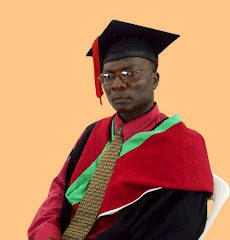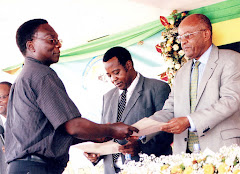Sixteen people were killed and 51 others seriously injured after two passenger buses collided at Kibingo village in Geita district, Mwanza region, yesterday. One of the buses involved in the accident was heading to Bukoba from Musoma while the other was going to Bukombe in Shinyanga region from Biharamulo. Speaking to The Guardian in separate interviews, Geita district commissioner (DC) Philemoni Shelutete and District Medical Officer Dr Omary Dihenga said the accident occurred in the morning, attributing it to careless driving. The driver of one of the buses (T 268 AJC) owned by Sheraton Limited, heading to Bukombe in Shinyanga collided with another bus, christened Bunda which was heading in the opposite direction, when trying to overtake a lorry (T 823 BPV) belonging to Nyanza Bottling Ltd.
 Mwanza acting regional police commander (RC) Nonosius Komba
Mwanza acting regional police commander (RC) Nonosius KombaAddressing reporters, Mwanza acting regional police commander (RC) Nonosius Komba said 12 people died on the spot and three others died at Geita district hospital where they were rushed for treatment. The other one died on the way to Bugando referral hospital. Komba said the drivers of the buses involved in the accident were in police custody for interrogation. For his part, Dr Dihenga said 11 bodies had been identified by relatives. He named them as Danny Zabron who died on the way to Bugando referral hospital, Maneno Ngassa, Mwarabu, Amani Deogratius, Samson Sanga and Msemakweli. Others are Johnson Nyonyi, Khalfan Chinga, Sumbuko Paulo, Samson and Deogratius Makunga. Dr Dihenga told this paper through the telephone that two toddlers Amina Abdallah (six weeks old) and Dickson Lazaro (one month old) survived without injury. The injured according to Dr Dihenga are Venance Nestory, Masoud Athuman, Abel Shimbo, Ibrahim Kihungwe, Mudashiri Joseph, Mabula Lusegwa, Jumanne Katoto, Zanzibar Kitangila, Enock Paulo, Mussa Kashiriri, Sele Elius, Deogratius Mathias, Fikiri Leonard, Claud Mashimba, Mchungaji Jonasi, Tupatupa and Isaya Ally. Others are Samuel Lukanye, Charles Maige, Libu Kahadi, Kimbi Bahati, Nathaniel Bernad, Masai Magembe, Emmanuel Mabala, Boniface Kitagalo (who were referred to Bugando), Joseph Mabwanga (Bugando), Tereza Tondane (Bugando) and Juma Fanuel (Bugando). He named other passengers who were injured as Christina Joseph, Imaculata Mgula, Emilian Joseph, Godnes Joseph, Veronica Lwagalo, Marietha Kalokola, Dadia Bernad, Edith Charles, Agnes Moris, Thereza Ondope, Salome Alon, Agripina Nathaniel, Gretuda Hoston, Edna Jackson, Leon, Chiza, Lulu Kishabakaki (Bugando), Forestina Magige (Bugando), Christina Joseph and Mawazo Nicolaus (Bugando).
SOURCE: THE GUARDIAN













